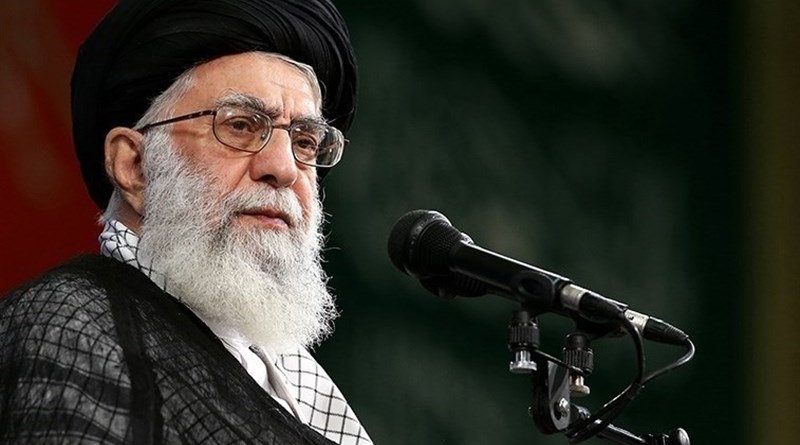Iran: Khamenei Reveals His Desperation In His Speeches – OpEd
Sunday, June 4, marked the 34th anniversary of the death of the Iranian regime’s founder Ruhollah Khomeini. Three decades after Khomeini’s death, his successor, supreme leader Ali Khamenei, laid bare the regime’s weakness in his speech in homage to Khomeini.
Reeling from the effects of the nationwide uprising that rattled the foundations of his so-called “consolidated system,” Khamenei blatantly called brave Iranian protesters who resisted the regime’s armed forces with bare hands “armed thugs.”
“The younger generations need to realize Imam Khomeini’s views. The enemy tries to annihilate hope and faith. Be careful; the enemy is lurking. Its last effort so far happened during last fall’s riots, but they will be doing some evil deeds soon. Some low-level armed thugs, mobilized by those who betrayed the country and their pawns, instigated armed riots and killed Basiji members and police forces,” Khamenei blatantly claimed.
While trying to twist the truth, Khamenei tacitly acknowledged his regime’s desperation and deadlock and that:
- Despite four decades of propaganda, Iranian youth reject the ruling theocracy and its backward thinking.
- There is an organized resistance movement that poses a great threat to the clerical regime and can mobilize a restive society.
- Iranian people are willing to topple this regime at any cost and despise anyone and anything representing it.
Khamenei is not afraid of an imaginary enemy. That enemy is Iran’s organized opposition, the People’s Mojahedin Organization of Iran (PMOI/MEK) and its Resistance Units Network, which have valiantly challenged the regime’s grip on power through countless operations campaigns, such as torching the regime’s symbols, which has become a common practice among defiant youth.
In his litany of lies, Khamenei also acknowledged the failure of his “consolidated system,” which he paid a heavy price to set it up.
Khamenei said that he had “repeatedly warned officials that the enemy is lurking, and they should increase their cooperation.” In a May 26 speech, Khamenei said, “A very important strategy is the cooperation between heads of three branches. They all should cooperate and synthesize. The constitution has created a perfect opportunity for them to work together; if so, they can overcome every problem. I advise the heads of the three branches not to block each other’s path and instead to pave the way for one another.”
A couple of weeks later, the regime’s infighting reached a new level. Khamenei envisioned a consolidated “Young and Hezbollahi government.” He, therefore, appointed Ebrahim Raisi as the regime’s president and handpicked the parliamentarians with Mohammad Bagher Ghalibaf as the parliament speaker.
But on Saturday, Ghalibaf said, “Executive officials and managers squander $104 billion annually” that “no one can trace it,” blaming the country’s increasing social and economic crises on Raisi’s government.
On June 4 state-run Bahar website, which is affiliated with Khamenei, lashed out at Ghalibaf and wrote in this regard: “Your remarks about a $104 billion corruption by officials burnt us to the bones. Mr. Ghalibaf, please choose your words carefully. Have you forgotten whom you are addressing? Are you, God forbid, addressing Mr. Raisi’s government? Or do you fear that they react and speak about someone else?”
Mostafa Pourmohammadi, former Judiciary chief, also acknowledged the crumbling of Khamenei’s “consolidated system” in a June 5 interview with the state-run Khabarban-e Iran website. “Still, [unity] is our concern. When we see these rifts, we should understand that we have been detracted from Imam Khomeini’s path,” he said.
Trying to revive a dead movement
In another part of his speech on Sunday, Khamenei also tried to promote his regime’s sham parliamentary elections by giving hollow promises to the so-called “reformist” faction, hoping that they can once again deceive Iranians and the world community to follow the mirage of moderation in the clerical regime.
“The enemy tries to spread pessimism about the elections. I will address the next year’s elections if I am alive and have the chance. This election is very important because the enemy has started to undermine it using its propaganda arsenal. But, our beloved people should make the enemy fail by their presence,” he said.
Iranian people once and for all buried the myth of reformism during the nationwide protests in 2018 by chanting, “reformists, hardliners, the game is over.” They have rejected any return to the past, as demonstrated in the popular slogan of “monarchy, the absolute rule of clergy, one hundred years of crime.” They consider regime change as the only solution to all their problems, as evident in their slogan of “poverty, corruption high prices, we continue until regime change.”
Mahmoud Hakamian writes for PMOI/MEK, which published this article

